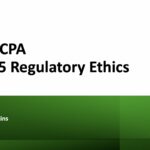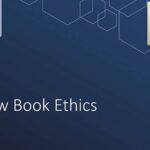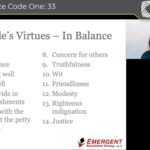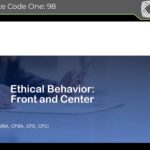Building a Framework for Regulatory Ethics (LIET07/26)
Almost every CPA has heard of the AICPA Code of Professional Conduct. However, have you ever struggled to see how it applies to your professional life? The conceptual framework approach provides for the intersection between the Code of Professional Conduct and the everyday life of the CPA professional. Using case studies and discussion, this course will provide an overview of the AICPA Code of Professional Conduct, including the conceptual framework approach. Participants will also explore common licensing and CPE issues across state lines.
Ethical AI Practices for CPAs: Ensuring Responsible Use (LIET06/26)
Explore the ethical implications of using generative AI. This course addresses potential risks and dilemmas, providing guidelines to ensure responsible and compliant integration. Learn how to balance innovation with ethical obligations to maintain trust and integrity. This course is one of a four-part series on AI technology for CPAs. We recommend you attend all five presentations to develop a complete understanding of AI and its potential in accounting, tax and finance.
Regulatory Ethics (LIET05/LIET08)
This course covers ethical frameworks and rules regarding CPA practice and responsibilities. This course will meet the two-hour annual ethics requirement for SC CPAs.
Behavioral Ethics: Recognizing and Weighing Influences and AI in Ethical Decision Making? (LIET04/26)
When it comes to ethical decision making, are you pausing long enough to consider what or who might be influencing your decisions? As AI continues to evolve so does its role and influence on our ethical decision making. This course is designed to raise awareness and provide tips and tools for recognizing and weighing the roles of influences and AI in your ethical decision making.
Yellow Book Ethics (LIET01/26)
Enjoy a Fireflies Game with your family and SCACPA Central Chapter. Each person that registers will receive one ticket for a seat behind home plate. The first 50 people that pick up their ticket from will call will receive $15 of loaded value to spend on food and drinks as they choose. Registration for this event will close on August 6th to provide the listing of attendees to the will call coordinator. Discussion Leader: GLS, Alex Romero
General Ethics for Business (LIET06/25)
Unethical behavior can ruin professional careers. It can also result in fines, penalties, or even a loss of licensure. This course focuses on the moral dilemmas regularly faced by those that work in either public accounting or industry and how to making the most ethical decisions. Discussion Leader: Jennifer Louis
Regulatory Ethics (LIET03/25, LIET04/25, LIET08/25, LIET09/25, LIET10/25)
This course covers ethical frameworks and rules regarding CPA practice and responsibilities. This course will meet the two-hour annual ethics requirement for SC CPAs. Discussion Leader: Chris D. Jenkins
Ethical Behavior: Front and Center (LIET02/25, LIET05/25, LIET07/25, LIET13/25)
This behavioral ethics course provides guidance for identifying ethical dilemmas and how to make decisions when there are ethical considerations. This course uses a modern-day lens to address real world ethical questions. We will look at the role of leadership and company culture as influencers for day-to-day ethical decision making. Discussion Leader: Ramona Farrell










